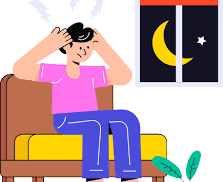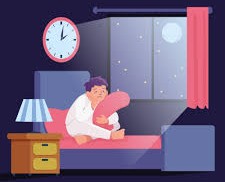Delayed Sleep Phase Syndrome: An Easy Guide to Understanding and Managing It


What Is Delayed Sleep Phase Syndrome
Q: Why do some people fall asleep so late even when they try to sleep earlier?
A: Many people experience this because of a condition called Delayed Sleep Phase Syndrome. It simply means the body clock runs later than normal, making it hard to fall asleep and wake up at the times most people do. People with this problem often feel frustrated because their body seems to work on its own schedule. It is not laziness or lack of discipline. It is actually a shift in the body’s inner rhythm.
Key thoughts:
- The natural sleep cycle becomes delayed.
- Falling asleep early feels almost impossible.
- Waking up for school, work, or morning tasks becomes a real struggle.
- Daily life becomes harder due to constant tiredness.
This leads to feeling out of sync with the world around them.
Why This Sleep Problem Happens
Q: What makes the body clock shift later than usual?
A: There are several reasons. Sometimes it is genetic, sometimes it develops during teenage years, and sometimes lifestyle habits push the sleep rhythm later without noticing. People who stay up with screens, work late shifts, or have unpredictable schedules may feel their sleep drifting later and later. But even people with balanced lives can experience this simply because their body clock is naturally delayed.
Key thoughts:
- Screen time at night affects the body’s night signals.
- Irregular routines confuse the inner clock.
- Teenagers naturally shift to later rhythms.
- Some people inherit late sleep tendencies from family.
This helps explain why the problem develops over time.
How Delayed Sleep Phase Syndrome Affects Daily Life
Q: Why does this condition feel so overwhelming for some people?
A: Because the body stays tired at the wrong times. Even when someone sleeps enough hours, they may still feel exhausted because their sleep does not match their daily responsibilities. This creates a cycle where everyday tasks become harder, mood becomes unstable, and focusing gets more difficult.
Key thoughts:
- Morning fatigue affects school or work performance.
- Mood swings become more common.
- Concentration decreases due to long-lasting tiredness.
- Social life becomes disrupted because the person feels awake when others sleep.
These challenges often make people feel misunderstood.
Lifestyle Adjustments That Help
Q: Can simple changes make a real difference?
A: Yes, gentle daily habits can start moving the sleep rhythm earlier. This is often the first step people try before using other methods. These small changes help the body slowly adjust to earlier sleep without feeling forced.
Key thoughts:
- Keeping the same wake time every day.
- Getting bright natural light in the morning.
- Reducing screen exposure at night.
- Creating a calm bedtime routine with dim lighting.
These steps slowly guide the body toward a more natural rhythm.
Controlled Light Exposure
Q: Why is morning light so powerful for this condition?
A: Because light is the main signal that tells the brain when to be awake. Getting bright light early helps push the body clock toward an earlier schedule. When done daily, this becomes one of the strongest natural ways to shift sleep earlier.
Key thoughts:
- Morning light resets the inner rhythm.
- Light in the afternoon or evening should be reduced.
- Going outdoors early helps even more.
- This method works best when repeated every day.
With time, these light cues gently shift the sleep cycle.
Melatonin (Restfine) as a Helpful Option
Q: Can natural sleep support help shift sleep times?
A: Yes, Melatonin, such as Restfine, can support the body in adjusting to an earlier bedtime. It works by signaling the brain that night time has arrived. People often use it as part of a larger sleep routine, especially when lifestyle changes alone are not enough.
Key thoughts:
- Helps the brain recognize sleep time earlier.
- Works best when taken at the same time each evening.
- Supports natural rhythm rather than forcing sleep.
- Often paired with morning light exposure.
This gentle support can make the shift feel smoother.
How Melatonin (Restfine) Fits Into Daily Routine
Q: When is natural melatonin support most useful?
A: It is most helpful when the person feels "wired" late at night but wants to move sleep earlier. When used regularly, Melatonin (Restfine) helps create a steady pattern. It becomes part of a balanced approach that includes habits, light, and calming routines.
Key thoughts:
- Works slowly over several days or weeks.
- Helps reduce late-night wakefulness.
- Supports a more natural sleep pattern.
- Best used under guidance from a medical expert.
It brings another layer of stability to the sleep schedule.
Working With the Body Instead of Against It
Q: Is there hope for people who feel stuck in a late sleep cycle?
A: Absolutely. With consistency, patience, and the right tools, the sleep rhythm can shift earlier. It takes time, but many people see a clear improvement when combining lifestyle changes, morning light, and natural sleep support like Melatonin (Restfine). The key is understanding that this condition is real and manageable.
Key thoughts:
- Slow progress still counts as progress.
- A combined method works better than one alone.
- Many people improve with steady routines.
- Support from professionals helps guide the process.
This gives people confidence that change is possible.
Final Thoughts
Delayed Sleep Phase Syndrome can feel frustrating, but it is a condition that responds well to patience, routine, and simple supportive tools. By understanding the body clock and gently guiding it with healthier habits, morning light, and natural sleep support when needed, many people regain control of their sleep and energy. With consistent effort, the body can learn a new rhythm that feels more natural and balanced.
Drug Description Sources:
- U.S. National Library of Medicine
- Drugs.com
- WebMD
- Mayo Clinic
- RxList
- Cleveland Clinic
- MedlinePlus
- Healthline
- MedicineNet
Reviewed and Referenced By:
- Dr. Alan Carter, Doctor of Pharmacy Clinical pharmacist specializing in chronic pain management and antiepileptic medicines. Frequently cited on Drugs.com for reviewing therapeutic guidance on safety and usage details.
- Dr. Emily Hart, Doctor of Medicine Internal medicine specialist who contributes medical explanations and patient-friendly summaries for WebMD and MedlinePlus.
- Dr. Michael Lawson, Doctor of Pharmacy Pharmacology educator known for reviewing medicine facts on Mayo Clinic and Cleveland Clinic platforms, focusing on safe usage and patient guidance.
- Dr. Sarah Donovan, Doctor of Medicine Sleep health specialist who supports Healthline and MedicineNet by reviewing articles related to sleep patterns, natural supplements, and common rhythm disorders.
(Updated at Nov 22 / 2025)

